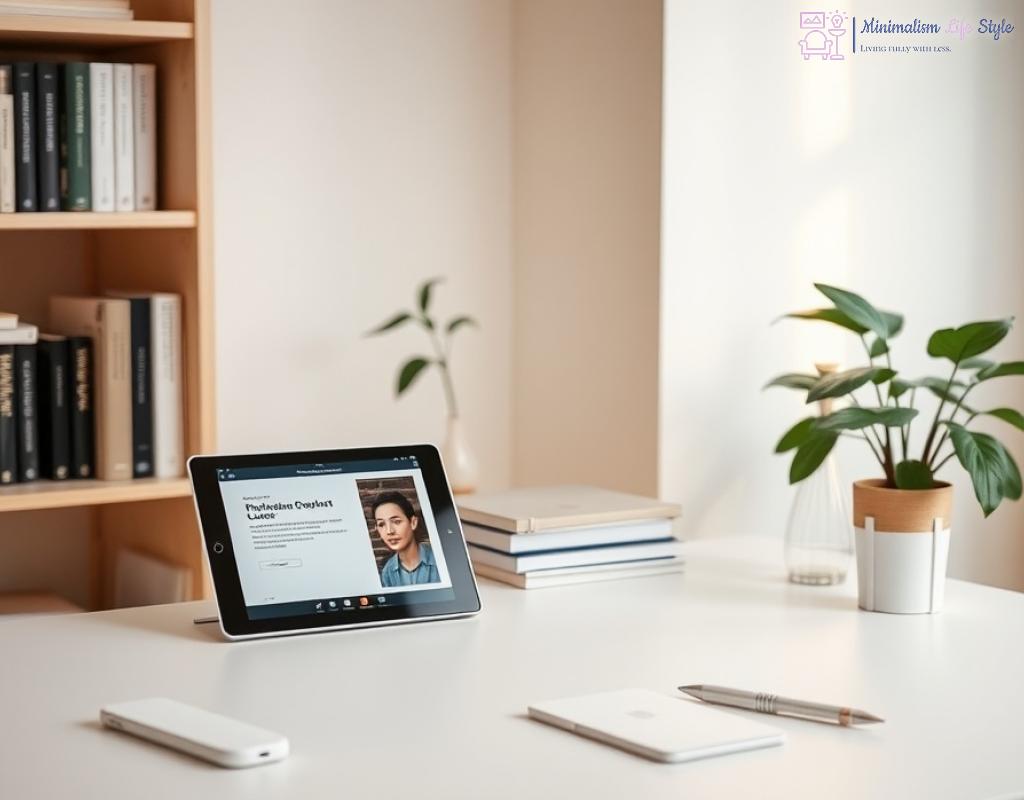Streamlining Your Learning Journey

In today’s fast-paced professional environment, the ability to learn efficiently can set you apart from the competition. Instead of scattering your efforts across various skills, focused learning allows you to hone in on what truly matters. This approach not only saves time but also enhances retention and application of knowledge.
To effectively streamline your learning journey, you need a well-structured strategy. This involves identifying your core skills, setting clear objectives, and utilizing resources that align with your goals. Here are some strategies you can adopt:
- Identify Skill Gaps: Assess your current skills against those needed in your role or desired position.
- Set SMART Goals: Create Specific, Measurable, Achievable, Relevant, and Time-bound goals for your learning.
- Leverage Technology: Utilize online courses and webinars that offer targeted training on specific skills.
- Seek Feedback: Regularly ask for feedback from peers or mentors to guide your learning process.
Each professional journey is unique, and so should be your learning path. By tailoring your learning experiences, you can ensure that you remain engaged and motivated. Consider the following elements when designing your personalized pathway:
| Element | Description |
|---|---|
| Skill Selection | Choose skills that are most relevant to your career goals. |
| Resource Allocation | Identify the best resources, such as books, courses, or mentors. |
| Time Management | Dedicate specific time slots for learning to create consistency. |
| Reflection and Adjustment | Regularly evaluate your progress and adjust your learning strategies as needed. |
By focusing on these elements, you can create a streamlined and effective learning journey that not only enhances your skills but also aligns with your professional aspirations.
Identifying Key Skills for Success
In the ever-evolving landscape of professional development, identifying key skills is essential for carving out a path to success. Without a clear vision of which skills will propel you forward in your career, you risk investing time and energy into areas that may not yield the desired results. Embracing a focused approach to skill acquisition not only streamlines your learning but also amplifies your professional impact.
To begin, it is crucial to conduct a thorough self-assessment. This means taking a step back to analyze your current capabilities and understanding the expectations of your desired role. By pinpointing the skills that are in demand within your industry, you can strategically align your learning endeavors. Consider engaging in conversations with industry professionals, seeking insights into what they deem essential for success. Such proactive outreach can illuminate the skills that are not only relevant but also increasingly valuable in your field.
Once you have a clearer picture of the skills you need, the next step involves aligning these skills with your career aspirations. Rather than adopting a one-size-fits-all mentality, focus on the specific competencies that resonate with your professional goals. For instance, if you aspire to lead a team, honing in on leadership and communication skills becomes paramount. On the other hand, if your aim is to excel in a technical role, deepening your understanding of relevant software or methodologies should take precedence. By aligning your skill acquisition with your aspirations, you create a cohesive learning pathway that is both purposeful and motivating.
Lastly, the journey of skill acquisition is ongoing, and it requires a commitment to continuous evaluation and adaptation. As you delve into new areas of learning, regularly assess your progress and the relevance of your chosen skills. The professional landscape is dynamic, and what may be essential today could evolve tomorrow. By remaining adaptable and open to feedback, you can ensure that your skillset not only meets current demands but also prepares you for future challenges. Embrace opportunities for growth and stay attuned to industry trends to maintain your competitive edge.
Effective Strategies for Focused Practice
In a world overflowing with information and learning opportunities, it is vital to cultivate focused practice methods that cut through the noise. This approach not only enhances your skill acquisition but also ensures that each learning experience is purposeful and impactful. By implementing effective strategies for focused practice, you set the stage for a transformative learning journey that aligns with your professional ambitions.
Establishing a Consistent Routine is paramount for successful skill acquisition. When you dedicate specific times for practice, you create a habit that fosters deeper engagement with the material. Consider incorporating brief, regular sessions rather than extensive, sporadic ones. This allows for better information retention and minimizes cognitive overload. As you immerse yourself consistently, you also cultivate a mindset of discipline and commitment, which is crucial for mastering new skills.
Furthermore, deliberate practice is the cornerstone of effective skill development. Unlike general practice, which may lead to superficial learning, deliberate practice focuses on pushing your limits and honing specific aspects of your skills. Identify areas where you struggle and concentrate your efforts there. For example, if public speaking is your target skill, practice delivering presentations in front of a mirror or record yourself to analyze body language and vocal tone. This targeted approach accelerates improvement and builds confidence, ensuring that you are not just going through the motions but truly evolving as a professional.
Moreover, seeking external input can significantly enhance your focused practice. Engaging with mentors or joining peer study groups can provide invaluable insights and diverse perspectives. By sharing experiences and receiving constructive feedback, you can refine your techniques and identify blind spots in your learning process. Collaboration not only enriches your practice but also fosters a sense of community that can motivate you to stay committed to your goals.
Measuring Progress and Celebrating Wins
In the journey of focused skill acquisition, measuring your progress is not just a reflection of how far you’ve come but also a powerful motivator to keep you on track. As you immerse yourself in the process, it becomes essential to have clear metrics to gauge your development. This not only aids in maintaining your enthusiasm but also reinforces the value of your efforts. Recognizing your achievements, no matter how small, can provide the encouragement needed to propel you forward.
Setting milestones is a pivotal strategy that enables you to break down your learning journey into manageable segments. By defining these checkpoints, you can monitor your progress and ensure you are on the right path. Consider the following steps when establishing your milestones:
- Short-term Goals: Establish weekly or monthly objectives that lead to your larger aspirations. These can include completing a specific course or mastering a particular skill.
- Skill Assessments: Regularly evaluate your skills through quizzes, practical applications, or peer reviews to understand your growth trajectory.
- Feedback Loops: Engage with mentors or colleagues to receive constructive feedback, which can highlight areas of improvement and reinforce your progress.
Recognizing your achievements is equally as important as measuring progress. Celebrations can range from simple self-acknowledgment to sharing your victories with peers, creating a sense of accomplishment that fuels further learning. Here are some approaches to celebrate your wins:
- Personal Reflection: Take time to reflect on what you have achieved, writing down your accomplishments and how they align with your original goals.
- Share Your Success: Communicate your progress with your network. This not only reinforces your commitment but can also inspire others in their learning journeys.
- Reward Yourself: Treat yourself to something special when you reach a significant milestone, reinforcing the positive behavior of dedicated learning.
By measuring progress and celebrating wins, you create a motivating cycle that encourages continuous improvement. As you navigate through your professional development, remember that each step forward is part of a broader journey toward mastery and success.
Creating a Sustainable Learning Routine
In the realm of professional development, the journey toward skill acquisition can often feel overwhelming. However, by establishing a sustainable learning routine, you can transform this journey into an enriching experience. A well-defined routine not only minimizes distractions but also maximizes your learning potential, enabling you to focus on what truly matters. This approach encourages consistency and fosters a mindset geared towards continuous growth, aligning perfectly with your professional aspirations.
To create a sustainable learning routine, it’s essential to find the right balance between structure and flexibility. While a structured schedule helps in setting clear expectations, flexibility allows you to adapt to unexpected changes in your workload or personal life. For instance, designate specific days or time slots for learning activities, but remain open to adjusting these as necessary. This adaptability can prevent burnout and keep your motivation levels high, ensuring that your learning remains a positive experience rather than an added stressor. By recognizing that life can be unpredictable, you cultivate a routine that respects both your professional commitments and your personal well-being.
In today’s digital age, technology plays a pivotal role in supporting a sustainable learning routine. Utilizing various online platforms and tools can streamline your learning process, making it more engaging and efficient. Consider integrating productivity apps that allow you to set reminders for learning sessions, track your progress, and even connect with peers for collaborative learning experiences. Moreover, online courses often offer the flexibility to learn at your own pace, allowing you to tailor your learning schedule according to your personal and professional demands. By leveraging these technological advancements, you can create an environment that is conducive to focused skill acquisition.
Reflection is an often-overlooked component of a sustainable learning routine. Taking the time to evaluate your progress and experiences can lead to valuable insights that inform your future learning strategies. After each learning session, consider journaling about what you learned, what challenges you faced, and how you can improve in subsequent sessions. This practice not only reinforces your knowledge but also enhances your self-awareness, helping you to adjust your routine effectively. By embedding reflection into your learning process, you ensure that your routine remains dynamic and continuously aligned with your evolving goals.




